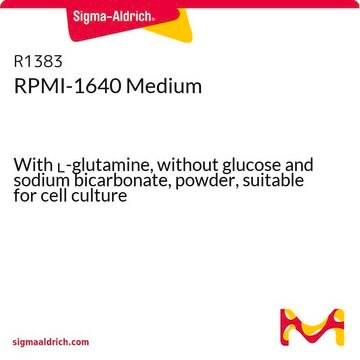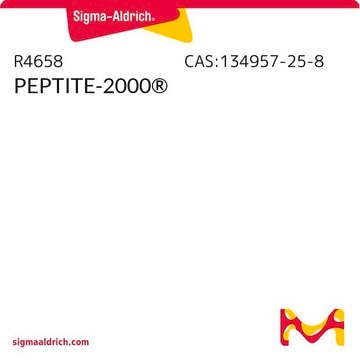R8755
RPMI-1640 Medium
With ʟ-glutamine, without phenol red and sodium bicarbonate, powder, suitable for cell culture
Synonym(s):
Roswell Park Memorial Institute 1640 medium
About This Item
Recommended Products
product name
RPMI-1640 Medium, Modified, with L-glutamine, without phenol red and sodium bicarbonate, powder, suitable for cell culture
form
powder
technique(s)
cell culture | mammalian: suitable
components
HEPES: no
phenol red: no
L-glutamine: yes
NaHCO3: no
sodium pyruvate: no
shipped in
ambient
storage temp.
2-8°C
Looking for similar products? Visit Product Comparison Guide
Related Categories
General description
Application
- Used in cell culture medium: Murine thymoma EL-4 cells were cultured in RPMI 1640 medium supplemented with other components
- Used for the mycobacterial infection of splenocytes (in antibiotic-free RPMI 1640 medium)
- Used for cell isolation and culture
- Used in culture medium (as one of the component) during lymphocyte separation and culture, ELISPOT Assay, Ex Vivo Proliferation Assay
- Used in medium for gp39 gene expression and CD40-Immunoglobuin binding assays
- Used for the preparation of antifungal agents
Quantity
Reconstitution
Other Notes
also commonly purchased with this product
supplement
Storage Class Code
11 - Combustible Solids
WGK
WGK 2
Flash Point(F)
Not applicable
Flash Point(C)
Not applicable
Certificates of Analysis (COA)
Search for Certificates of Analysis (COA) by entering the products Lot/Batch Number. Lot and Batch Numbers can be found on a product’s label following the words ‘Lot’ or ‘Batch’.
Already Own This Product?
Find documentation for the products that you have recently purchased in the Document Library.
Customers Also Viewed
Articles
ELISpot assay provides qualitative and quantitative information on immune responses, visualizing multiple secretory products from single responding cells.
Our team of scientists has experience in all areas of research including Life Science, Material Science, Chemical Synthesis, Chromatography, Analytical and many others.
Contact Technical Service





